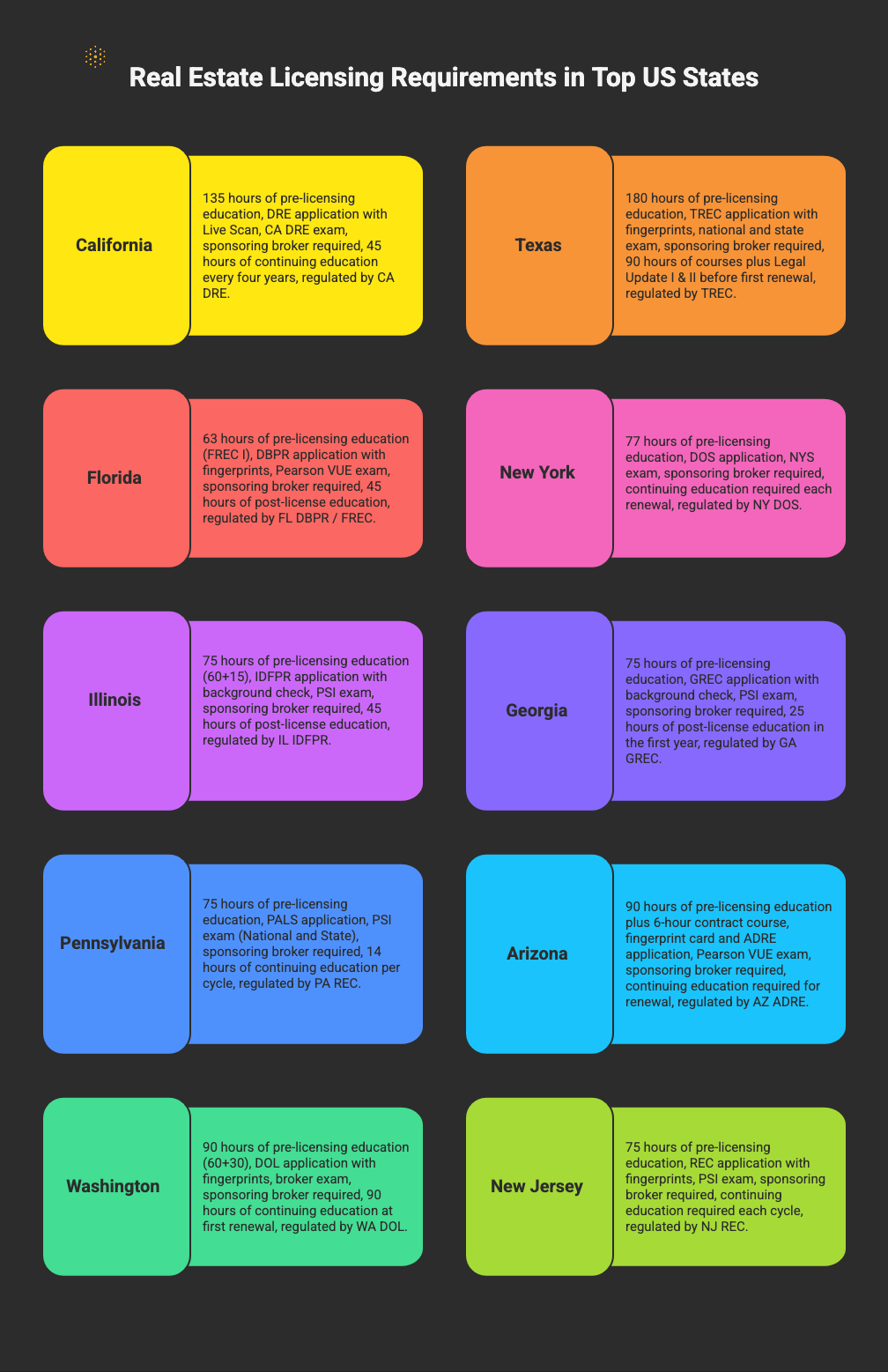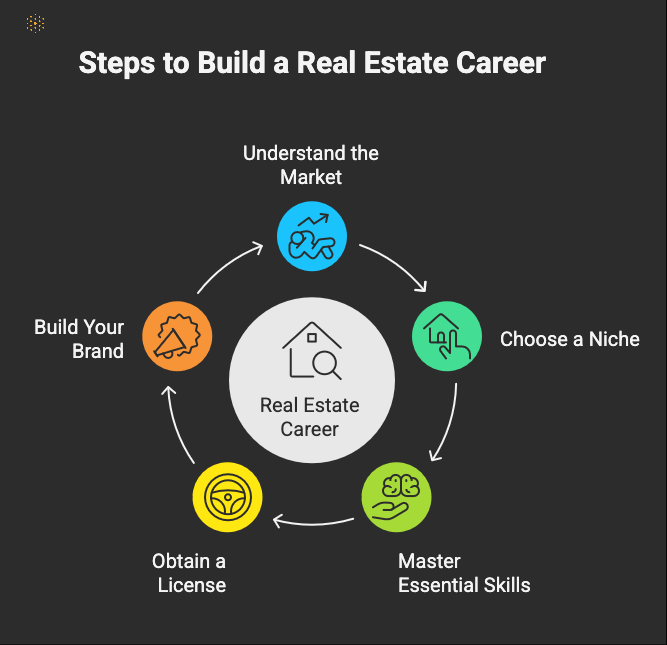How to start a career in real estate?
Understand the market and pick a niche; get licensed by completing required education, passing the state exam, and joining a broker. Then build skills in communication, negotiation, and marketing, and grow your brand through networking and service.
With about 46,300 annual openings, plus flexible hours and high earning potential, it’s no wonder so many people are drawn to the real estate industry.
But the same reasons also make it one of the most competitive fields. Only those who prepare strategically manage to build lasting success.
To stand out, you need to understand the market, choose the right niche, master people skills, and develop a personal brand that sets you apart.
Here’s a clear roadmap to help you navigate the essentials of starting and growing a successful real estate career.
1. Understand the Real Estate Landscape
Before you jump in, it’s crucial to understand the market you’re about to enter. The U.S. real estate market is a massive and dynamic part of the economy.
In 2024, despite fluctuations in mortgage rates, home prices have shown remarkable resilience and growth.
This indicates a fundamentally strong demand for housing across the country. Looking ahead, the market is projected to grow at a CAGR of 2.80% between 2025 and 2034.
What fuels this industry?
- Life Events: People are always moving. They get married, have children, relocate for jobs, or downsize for retirement. These life changes are the constant engine of the real estate market.
- Investment: Real estate is a cornerstone of investment portfolios. From individuals buying a rental property to large firms investing in commercial buildings, real estate is a key asset class.
- Economic Factors: Interest rates, employment rates, and overall economic health all play a significant role. A strong economy typically means a strong real estate market.
- Technology: The way we buy and sell homes is changing. Virtual tours, online mortgage applications, and digital marketing have become standard. Agents who embrace technology have a significant edge.
Understanding these fundamentals is the first step. It helps you have intelligent conversations with clients and make smarter decisions for your own business.
It’s not just about knowing the price of a house on a specific street; it’s about understanding the "why" behind that price.
2. Choose Your Real Estate Niche
"Real estate" is a broad term. To truly succeed, it helps to specialize.
Finding a niche allows you to become the go-to expert in a specific area, which makes marketing yourself much easier.
Here are some of the most popular and lucrative career paths within the industry:
- Residential Real Estate Agent: This is the most common path. You'll help individuals and families buy and sell their homes. It’s incredibly rewarding to hand over the keys to a first-time homebuyer or help a growing family find their forever home. Median Salary: $100,070 per year. Keep in mind, this is heavily commission-based, and top agents earn well into six figures.
- Commercial Real Estate Agent: Instead of homes, you’ll deal with properties like office buildings, retail spaces, and warehouses. The deals are often larger and more complex, which can mean bigger commissions.
- Property Manager: If you’re organized and good with people, property management could be a great fit. You'll manage rental properties for owners, handling everything from finding tenants and collecting rent to coordinating maintenance. Median Salary: $63,190 per year.
- Real Estate Appraiser: Appraisers provide an unbiased, professional opinion on the value of a property. This is a critical role for lenders, buyers, and sellers.
- Leasing Agent: Similar to a residential agent, but you focus exclusively on helping people find rental properties. This is a fast-paced role, especially in large cities.
- Luxury Real Estate Specialist: This niche focuses on high-end, multi-million dollar properties. It requires exceptional service, discretion, and a strong network of high-net-worth individuals.
Also Read: How much do real estate agents earn?

3. Get Your Real Estate License
This is the most crucial administrative step. You cannot legally help someone buy or sell a property without a real estate license.
The process varies by state, but here is the general path you’ll need to follow:
- Meet the Basic Requirements: In almost every state, you must be at least 18 years old and have a high school diploma or GED.
- Complete Pre-Licensing Education: Each state requires you to complete a specific number of hours of real estate education from an approved school. These courses cover everything from real estate law and ethics to contracts and financing. You can often find these courses available online or in-person.
- Pass the State Real Estate Exam: Once you’ve completed your coursework, you’ll need to pass your state’s official real estate licensing exam. The exam typically has two parts: a national section covering general real estate principles and a state-specific section covering the laws in your state.
- Find a Sponsoring Broker: You can't work as an independent agent right away. You must work under a licensed real estate broker. This broker will supervise your work, provide training, and handle your commission payments. It’s important to interview several brokers to find a brokerage that offers the culture, training, and support that’s right for you.
- Complete Your License Application: Once you’ve passed your exam and have a broker, you can submit your application and associated fees to your state's real estate commission.
Getting your license is your official entry into the industry. From there, your success is in your hands.

4. Master the Skills That Matter
A successful real estate career is built on a foundation of specific skills. While passion is important, it’s these practical abilities that will help you close deals and build a loyal client base.
- Communication and Interpersonal Skills: This is the absolute cornerstone of the industry. You need to be able to actively listen to your clients' needs, clearly explain complex contracts, and build rapport with a wide variety of people.
- Negotiation: Every transaction involves negotiation. Whether you’re advocating for your buyer’s offer or securing the best price for your seller, strong negotiation skills are essential to getting the best possible outcome for your clients.
- Marketing Expertise: You’re not just selling a house; you’re selling yourself as a trusted advisor. You need to know how to market your listings effectively (professional photos, compelling descriptions, social media promotion) and how to market your personal brand to attract new clients.
- Local Market Knowledge: To be a true expert, you need to know your market inside and out. This means understanding different neighborhoods, school districts, property tax rates, and future development plans. This knowledge is what makes you invaluable to your clients.
- Problem-Solving: Real estate transactions are rarely straightforward. A home inspection might reveal issues, or a buyer's financing could fall through. Your ability to stay calm, think critically, and find solutions is what will get a deal to the closing table.
- Tech Savviness: From using the Multiple Listing Service (MLS) to managing your client relationships with a CRM (Customer Relationship Management) tool and leveraging social media, technology is an integral part of the modern real estate business.
These skills aren't just learned overnight. They are developed through experience, continuing education, and a commitment to constant improvement.
5. Build Your Brand and Business
Once you have your license, you are officially a business owner. Your success will depend on your ability to attract and retain clients. This is where building a strong personal brand comes in.
- Create a Professional Resume: Even though you’ll be working for yourself, a polished resume is essential when you're interviewing with brokerages. It should highlight your skills, especially in sales, customer service, and marketing.
- Develop Your LinkedIn Presence: Your LinkedIn profile is your digital storefront. Add a professional headshot, write a compelling “About,” optimize your headline, and share market insights and listings to stay visible.
- Network Relentlessly: Real estate is a relationship business. Tell everyone you know that you’re in real estate. Attend local community events. Join your local chamber of commerce. Build relationships with mortgage lenders, home inspectors, and other professionals in the industry. Your network will be your greatest source of referrals.
- Provide Unforgettable Service: The surest way to build a sustainable business is through word-of-mouth. Go above and beyond for every single client. Be responsive, be honest, and be their trusted advisor through what is often one of the biggest financial decisions of their lives. A happy client will not only use you again in the future but will also recommend you to their friends and family.

Final Thoughts
Building a career in real estate takes time, effort, and a genuine passion for helping people. By following these steps, you can lay a strong foundation for a long, successful, and incredibly rewarding career.
And while much of this journey depends on your drive, the right tools can make the process faster and easier.
Hiration can help you polish your resume, optimize your LinkedIn presence, and practice interviews, giving you a professional edge as you enter this competitive industry.
Here’s to a strong start and a rewarding career ahead!
Frequently Asked Questions
-
What are the main steps to start a career in real estate?
Understand the market, choose a niche, get your real estate license, master key skills, and build your brand and business.
-
Do you need a license to help someone buy or sell a property?
Yes. You cannot legally help someone buy or sell a property without a real estate license.
-
What are the basic eligibility requirements to get a real estate license?
In almost every state, you must be at least 18 years old and have a high school diploma or GED.
-
What does the real estate licensing process involve?
Meet the basic requirements, complete pre-licensing education, pass the state exam, find a sponsoring broker, and complete your license application.
-
Can you work independently as a new real estate agent?
No. You can't work as an independent agent right away; you must work under a licensed real estate broker.
-
Which real estate niches can you specialize in?
Options include residential real estate agent, commercial real estate agent, property manager, real estate appraiser, leasing agent, and luxury real estate specialist.
-
What skills matter most for success in real estate?
Focus on communication and interpersonal skills, negotiation, marketing expertise, local market knowledge, problem-solving, and tech savviness.
-
What factors drive the real estate market?
Key drivers include life events, investment activity, economic factors such as interest and employment rates, and technology like virtual tours and online applications.
-
How do residential and commercial real estate agent roles differ?
Residential agents help individuals and families buy and sell homes. Commercial agents handle properties like office buildings, retail spaces, and warehouses, and deals are often larger and more complex.
-
What growth is projected for the U.S. real estate market?
The market is projected to grow at a CAGR of 2.80% between 2025 and 2034.



